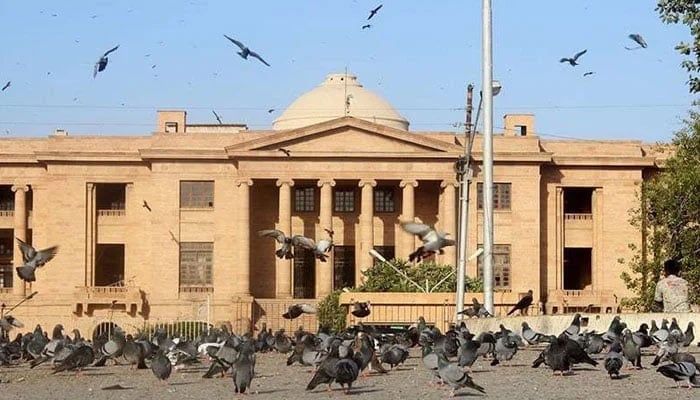SHC serves notices on attorney general, others on pleas against 26th Amendment
The Sindh High Court (SHC) on Thursday issued notices to the attorney general of Pakistan, Sindh advocate general and others on petitions challenging vires of the 26th Constitutional Amendment with regard to the chief justice and superior courts judges’ appointment criteria, constitution of constitutional benches and curtailment of suo motu powers of the apex court.
A division bench of the high court headed by Chief Justice Mohammad Shafi Siddiqui observed that it was cognisant of the fact that in terms of the amendment, such questions were to be brought before the constitutional benches, however, the challenged amendments suggested that the application of the Article 202A that enabled the formation of constitutional benches for the provinces could only be kicked in once the province / provinces had passed such a resolution for onward carving out constitutional benches.
The high court observed that in the absence of such resolution and constitutional benches, judges were exercising jurisdiction per roster assigned to different benches.
The SHC observed that the petitions that challenged the 26th Amendment had brought a question and in such attempt the counsel had argued that this amendment in particular the Articles related to the dispensation of justice has shaken the judicial structure.
The counsel for the petitioners submitted that the impugned amendment had been amended in such a way that a litigant such as federation / province was seen to pick and choose benches for their own cause and for their own litigation and this had ignored a universal principle that justice should not only be done but seen to have been done.
The counsel argued that it had been shown to the public that the parliamentarians had conquered the judiciary by empowering their decisive strength in the judicial process and one of such process was the formation of the judicial commission.
They said that a litigant could not be allowed to evaluate the judges’ performance so as to “bully” and “threaten” future benches.
The judges observed that they were also cognisant of the fact that the Article 239(5) & (6) limited the jurisdiction of the court, however, it had been explained that such limits could not overshadow or eclipse the fundamental rights guaranteed under the Constitution.
The counsel argued that individuals may or may not matter but the matter of concern was the executives’ invasion into the regime of independent judiciary.
The counsel submitted that one such fundamental right, which was the independence of judiciary, had been compromised.
They said that the preamble of the Constitution also guaranteed the safeguard of the fundamental rights.
The high court observed that the points raised in the petitions and arguments of the counsel required consideration. The SHC observed that since some of the Articles through a recent amendment via the 26th Amendment of the Constitution had been challenged, therefore, it required a notice to the attorney general for Pakistan. The court issued notices to the attorney general, Sindh advocate general and other respondents, and called their comments on the next date of hearing.
The petitioners, who included Mohammad Ashraf Sammo, Malir Bar Association President Nasir Raza and others, had submitted that the 26th Amendment violated the principles of separation of power, judicial independence and rule of the law.
-
 Mexico’s President Considers Legal Action Over Elon Musk Cartel Remark
Mexico’s President Considers Legal Action Over Elon Musk Cartel Remark -
 Prince William Hits The Roof With The Andrew Saga Bleeding Into Earthshot
Prince William Hits The Roof With The Andrew Saga Bleeding Into Earthshot -
 HBO Gives Major Update About 'Industry' Season Five And Show's End
HBO Gives Major Update About 'Industry' Season Five And Show's End -
 Donnie Wahlberg Responds To 'Boston Blue' Backlash: 'Nobody Was More Disappointed Than Me'
Donnie Wahlberg Responds To 'Boston Blue' Backlash: 'Nobody Was More Disappointed Than Me' -
 Jennifer Garner Gets Emotional Over Humble Career Start: 'It Makes Me Want To Cry'
Jennifer Garner Gets Emotional Over Humble Career Start: 'It Makes Me Want To Cry' -
 Princess Beatrice Told An Acquaintance That She ‘likes’ Jeffrey Epstein: Grim Verdict Drops
Princess Beatrice Told An Acquaintance That She ‘likes’ Jeffrey Epstein: Grim Verdict Drops -
 Late Katherine Short's Neighbours Give Insights Into Her 'peace Loving' Personality Post Suicide
Late Katherine Short's Neighbours Give Insights Into Her 'peace Loving' Personality Post Suicide -
 Fresh Details Of King Charles, Queen Camilla's US Visit Emerge Amid Andrew Investigation
Fresh Details Of King Charles, Queen Camilla's US Visit Emerge Amid Andrew Investigation -
 Iran 'set To Buy' Chinese Carrier-killer Missiles As US Forces Gather In Region
Iran 'set To Buy' Chinese Carrier-killer Missiles As US Forces Gather In Region -
 Prince Harry And Meghan Unlikely To Meet Royals In Jordan
Prince Harry And Meghan Unlikely To Meet Royals In Jordan -
 Hero Fiennes Tiffin Shares Life-changing Advice He Received From Henry Cavill
Hero Fiennes Tiffin Shares Life-changing Advice He Received From Henry Cavill -
 Savannah Guthrie's Fans Receive Disappointing News
Savannah Guthrie's Fans Receive Disappointing News -
 Prince William Steps Out For First Solo Outing After Andrew's Arrest
Prince William Steps Out For First Solo Outing After Andrew's Arrest -
 Jake Paul Chooses Silence As Van Damme Once Again Challenges Him To Fight
Jake Paul Chooses Silence As Van Damme Once Again Challenges Him To Fight -
 Google Disrupts Chinese-linked Hacking Groups Behind Global Cyber Attacks
Google Disrupts Chinese-linked Hacking Groups Behind Global Cyber Attacks -
 Four People Killed In Stabbing Rampage At Washington Home
Four People Killed In Stabbing Rampage At Washington Home




